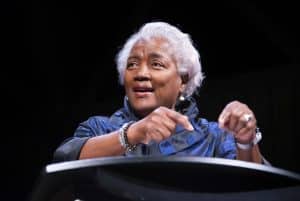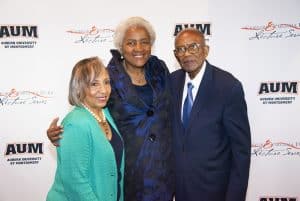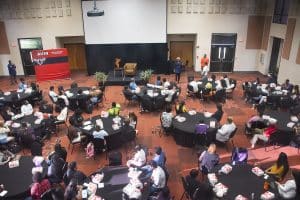Brazile addresses elusive concept of unity as 2023 Durr Lecturer
Donna Brazile understands the pessimism that exists over political polarization, the us vs. them, red vs. blue tribalism that has made cooperation a dirty word and eroded public trust in institutions.
Consider the polling results released by Pew Research Center in late-September: Positive views of many political and governmental institutions are at all-time lows. A mere 4 percent of survey respondents believe the American political system is working extremely well or very well. More than 60 percent of poll respondents expressed limited or no confidence at all in the future of the U.S. political system.
“Our national discourse is bad,” said Brazile, the ABC News commentator, best-selling author and long-time political strategist who served as Auburn University at Montgomery’s 2023 Durr Lecturer. “You can’t even have a sensible discussion over healthcare policy without name-calling.”

And yet, Brazile, whose lecture addressed the theme of “Can We Move Forward Together?,” expressed optimism that we will re-establish a sense of unity and cooperation despite the formidable headwinds. To illustrate this point, Brazile told a story about a man she had done everything in her power to prevent from becoming president in her capacity as the first African-American woman to lead a major presidential campaign. Her candidate, Al Gore, lost the 2000 election to George W. Bush despite winning the popular vote – the outcome being decided by a 5-week Florida recount that involved the U.S. Supreme Court and scrutiny of “hanging chads.”
Brazile did not believe Bush was qualified to be president, and her position remained firm in 2005 after Hurricane Katrina brought death and destruction to her native New Orleans. The neighborhood where she grew up, as the third of nine children, in a two-bedroom house a block from the Mississippi River, was devastated as levees gave way to Katrina’s sustained winds and storm surge.

Brazile recounted that, in the immediate aftermath of the storm, hope came from locals helping locals rather than from the federal government. Neighbors with boats arrived on the scene long before the National Guard or Federal Emergency Management Agency (FEMA). Her older sister and a 92-year-old great uncle were each rescued from rooftops – the only islands of refuge amid the floodwater. Her remaining siblings, father, uncle, aunts and relatives lost everything to a storm that claimed more than 1,800 lives and caused $108 billion in damage.
While Brazile was angered by FEMA’s slow response, she said she reached out to President Bush to offer assistance rather than criticism.
“I cared about my narrow self-interest as a citizen,” Brazile said. “I wanted the levees to be rebuilt. I wanted the schools to re-open.”
In 2005, then-Louisiana Gov. Kathleen Blanco asked Brazile to serve on the state’s commission overseeing long-term recovery from the devastation of Katrina. That role enabled Brazile to occasionally interact with the White House and assess President Bush’s ability to back up his stated post-Katrina promise: “We will do what it takes, we will stay as long as it takes, to help citizens rebuild their communities and lives.”
Between Katrina and the end of his presidency, Bush visited the Gulf Coast states 17 times, including 13 trips to New Orleans. He also oversaw the distribution of $126 billion in aid to Gulf Coast residents, placing an emphasis on rebuilding libraries, K-12 schools and universities. Charity Hospital, where Brazile was born, did not re-open in the aftermath of Katrina, but she notes that the city gained a Level One Trauma Center and now features an exemplary Veterans Administration hospital. All because of a spirit of cooperation at the local, state and federal levels that transcended political identity.
“If I can find common ground with George W. Bush …,” she said, pausing. “A man I didn’t think was capable or should have been elected president became one of my best friends. You can be a partisan and still get along with somebody. He put aside his partisanship, and I put aside my partisanship.”
Meeting in the middle
That friendship developed before Twitter and before its successor, X, and their social media companions emerged as places to inform, entertain, argue and deceive. Before the election of a black president. Before a wealthy reality TV host won the Electoral College vote in 2016 with scorched earth rhetoric. Before the emergence of Black Lives Matter, the COVID pandemic, January 6, impeachment, a war in Ukraine, indictments, another impeachment inquiry, a government shutdown, and questions about how old is too old to serve in the Oval Office.
Brazile was asked how she keeps the faith that the country will be OK when social media, cable TV talking heads and podcasters, and policymakers seem intent on trafficking in fear, anger and division. She pointed out that, while our country’s political divide may seem wider than the Grand Canyon, there is more common ground than we realize.

“Two-thirds of our citizens are unaffiliated [with a political party],” she said. “Sixty-five percent of Americans like their local government, but Congress is about as popular as a root canal. They [citizens] have grown tired of the discontent and the coarseness of our conversations. We need to be able to speak to one another with respect and civility. We have to see each other as human beings, not only capable of hurting but also of healing.”
Beyond softening the tone of our discourse, Brazile said we must demand more from our elected officials – no matter which party they represent. Our responsibility as citizens, she said, includes exercising our right to vote and getting involved in the issues and causes that matter most to us.
“We can’t get it right if 10 to 15 percent of us vote in primaries,” Brazile said. “Your vote will make one hell of a difference.”
When Brazile was 9 years old, she went door to door in her New Orleans neighborhood as a volunteer focused on registering new voters. She got involved because she and other children wanted a playground. Three hundred newly registered voters made enough of a difference that a playground materialized.
“Find a cause, find a community, and devote yourself to it,” Brazile said. “That is your call. Answer it. Don’t wait for somebody to text you. This is your moment – seize it.”
Brazile used that story as a means of challenging the Auburn University at Montgomery students she visited before her September 28 Durr Lecture.
“Why you? Why now?,” she asked. “Because tomorrow is not soon enough. It’s in your hands to protect freedom, justice and equality. You are going to be the majority of voters in this country next year. You can change the world. You’re the generation we’ve been waiting for – open minds and big hearts.”
The generation that could move us forward.
